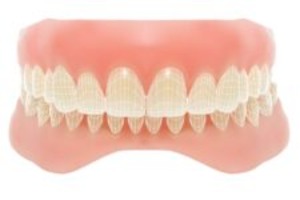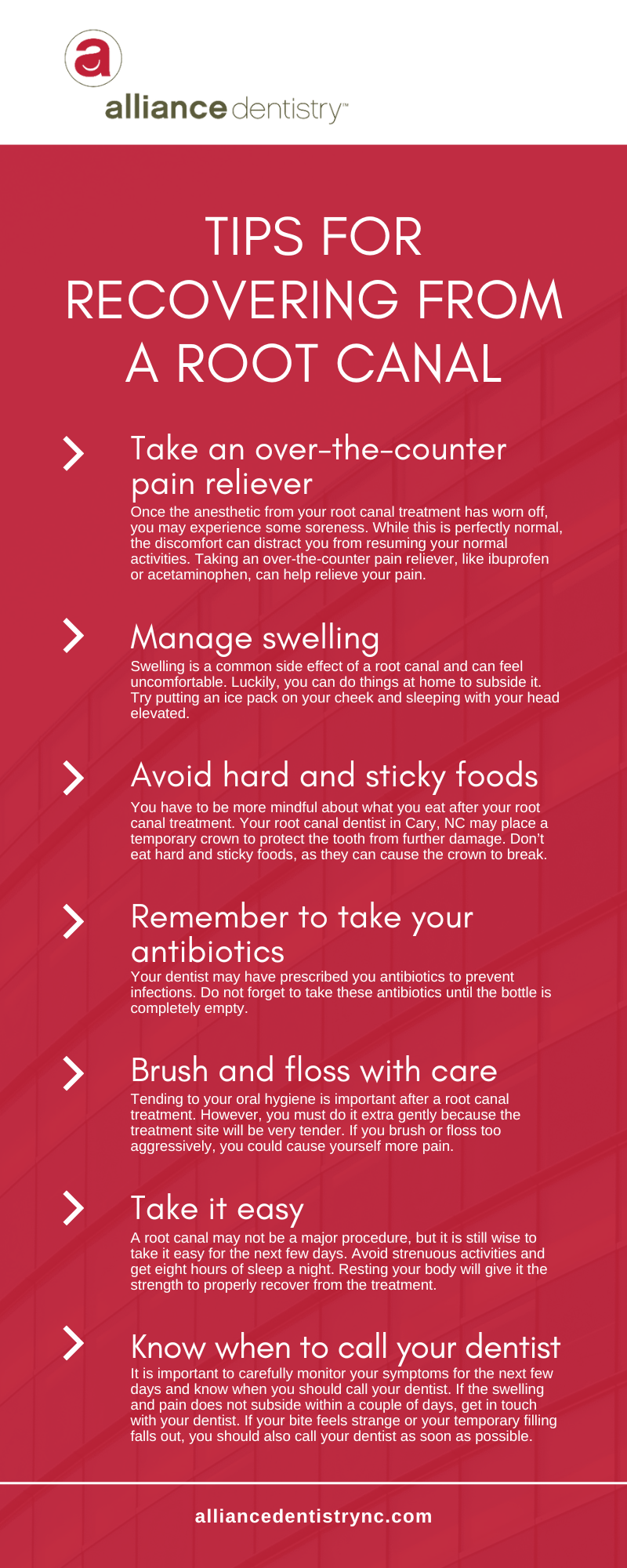Root Canals
 Root Canal Dentist Cary, NC
Root Canal Dentist Cary, NC
Our Cary, NC root canal dentists believe in providing comprehensive dental care to ensure our patients’ oral health and well-being. One of the critical procedures we offer is root canal therapy. Often surrounded by misconceptions, a root canal is a safe and effective treatment that can save a severely damaged or infected tooth, preserving your natural smile and preventing further dental complications. In this guide, we’ll delve into what a root canal is, why it’s necessary, and how our experienced team at Alliance Dentistry can help.
Table Of Contents
Understanding Root Canals
A root canal, technically known as endodontic therapy, is a dental procedure performed to treat the innermost part of a tooth called the pulp. The pulp is a soft tissue located within the tooth’s root canal, containing blood vessels, nerves, and connective tissues. When the pulp becomes inflamed or infected due to deep decay, cracks, repeated dental procedures, or trauma, it can lead to severe tooth pain and other complications.
During the root canal procedure, our skilled dentists remove the infected or damaged pulp to alleviate pain and prevent the spread of infection. The tooth is then carefully cleaned, disinfected, and filled with a biocompatible material to restore its structure and functionality. Finally, a dental crown is often placed on the treated tooth to provide added protection and enhance its appearance.
How Root Canal Therapy Can Help You
Root canal therapy can be beneficial for several reasons, including pain relief, infection prevention, tooth preservation, and improved oral health. An infected pulp can cause excruciating toothache and discomfort. Root canal treatment provides much-needed pain relief and resolves the underlying cause of the pain. Without timely intervention, a dental infection can spread to surrounding teeth, gums, and even the jawbone. Root canal therapy stops the infection from progressing, preventing potential dental emergencies.
By saving a damaged tooth with a root canal, you avoid the need for extraction, preserving your natural smile and maintaining proper dental alignment. Addressing the root cause of the problem through root canal therapy can lead to improved oral health and overall well-being.
Avulsed Teeth
A tooth is considered avulsed when it is knocked out of its socket entirely. Accident victims must be careful with an avulsed tooth if it is to be restored to its socket. You should handle an avulsed tooth carefully, as any misstep along the way can lead to permanent damage. It is essential to see a family or root canal dentist in Cary, NC as quickly as possible after a tooth has been knocked out. To optimize the chances of saving the tooth, there are a number of things you should keep in mind.
Try not to touch the root of the tooth, which is the part of the tooth that was under the gum line. It is a sensitive structure that can be damaged easily. To clean an avulsed tooth that is dirty, hold it by the crown (not the root) and rinse it with milk. If you don’t have milk, then rinse it with water. Keep the tooth moist by putting it into a glass of milk. If that is not possible given the situation, you can place the tooth in your mouth, holding it between the cheek and gum. Or, it can be placed in a cup filled with saliva. If those options aren’t available, you can keep the tooth moist by placing it in water. Seek dental intervention immediately, as there is only about a two-hour window of time to put the tooth back in the mouth if it is to survive.
Additionally, when a tooth is knocked out, the supporting tissues, nerves, and blood vessels may be damaged as well. The nerves and blood vessels cannot be repaired, so avulsed teeth will likely need a root canal. However, once the tooth is put back into its socket, the root of the tooth can reattach to the jawbone as it heals, and this will help restore the tooth to proper functioning. The odds are better for children than adults when it comes to saving avulsed teeth. Only the permanent teeth are reimplanted.
Scaling and Root Planing (Deep Cleaning)
In what most people consider a dental cleaning, plaque and tartar is removed from above the gum line. Individuals with periodontal disease, however, require a deep cleaning, called scaling and root planing. Scaling consists of removing tartar from above and below the gum line. Root planing smoothes out the rough spots along the root surface where germs gather, which helps to remove bacteria that contribute to the disease.
Arestin®
Arestin® is an antibiotic that helps kill the bacteria that contribute to periodontal disease. At Alliance Dentistry, we place Arestin ® into gum pockets at the time of scaling and root planing, making scaling and root planing more effective. Tiny, round particles slowly release the antibiotic over time into the gum tissues which allows for better healing and a reduction in the size of the periodontal pockets.
iLase ™
iLase ™ is a dental soft tissue laser designed for a variety of dental procedures. At our Cary, NC dentist office, we most commonly use iLase ™ for the retraction of tissues prior to crown impressions and for soft tissue crown lengthening in teeth that are otherwise too short for restorations.
Periodontal and Soft Tissue Management
At our Cary NC dentist office, we often see periodontal and soft tissue related issues in our patients. Research from the Centers for Disease Control and Prevention suggests over 47 percent of the US population aged 30 years and older have mild, moderate or severe periodontitis.* Periodontitis, also referred to as periodontal disease, is an inflammatory disease characterized by the loss of connective tissue between teeth and gums. If not treated, the bones and tissues that support the teeth may be destroyed. Eventually, teeth become loose and have to be removed.
How Our Root Canal Dentist Can Help You
While we do all we can to maintain teeth, there are occasions when removal of a tooth or multiple teeth is the best treatment for some patients. When such a procedure is necessary, a Cary NC dentist will discuss options for replacement of the missing teeth and have a satisfactory plan in place with which our patients feel comfortable. Often, this involves one or more implants. Our Cary, NC dentist office works closely with oral surgeons and periodontists in the area to deliver the best and most appropriate treatment for our patients.
Tips for Recovering from a Root Canal
A root canal is a routine procedure that can save your teeth. However, it is important to take good care of yourself. The better you take care of yourself, the faster you will heal. Here are some tips to recover from a root canal.
- Take an over-the-counter pain reliever
Once the anesthetic from your root canal treatment has worn off, you may experience some soreness. While this is perfectly normal, the discomfort can distract you from resuming your normal activities. Taking an over-the-counter pain reliever, like ibuprofen or acetaminophen, can help relieve your pain.
- Manage swelling
Swelling is a common side effect of a root canal and can feel uncomfortable. Luckily, you can do things at home to subside it. Try putting an ice pack on your cheek and sleeping with your head elevated.
- Avoid hard and sticky foods
You have to be more mindful about what you eat after your root canal treatment. Your root canal dentist in Cary, NC may place a temporary crown to protect the tooth from further damage. Don’t eat hard and sticky foods, as they can cause the crown to break.
- Remember to take your antibiotics
Your dentist may have prescribed you antibiotics to prevent infections. Do not forget to take these antibiotics until the bottle is completely empty.
- Brush and floss with care
Tending to your oral hygiene is important after a root canal treatment. However, you must do it extra gently because the treatment site will be very tender. If you brush or floss too aggressively, you could cause yourself more pain.
- Take it easy
A root canal may not be a major procedure, but it is still wise to take it easy for the next few days. Avoid strenuous activities and get eight hours of sleep a night. Resting your body will give it the strength to properly recover from the treatment.
- Know when to call your dentist
It is important to carefully monitor your symptoms for the next few days and know when you should call your dentist. If the swelling and pain does not subside within a couple of days, get in touch with your dentist. If your bite feels strange or your temporary filling falls out, you should also call your dentist as soon as possible.
Cary Root Canal Infographic
Cary Root Canal Dentist FAQs
How Do I Know If I Need a Root Canal?
Determining the need for a root canal requires a dental examination. You may require a root canal if you have persistent and severe tooth pain, sensitivity to hot or cold, swelling or tenderness around the tooth, or a darkening of the tooth. These symptoms often indicate infection or damage to the tooth’s pulp.
What Does the Process of Getting a Root Canal Entail?
The root canal procedure involves the removal of the infected or damaged pulp inside the tooth. Your dentist will carefully clean and disinfect the inside of the tooth, followed by filling and sealing it. This prevents further infection and restores the tooth’s function.
Is a Root Canal a Painful Procedure?
Modern root canal procedures are virtually painless. Local anesthesia is used to numb the affected area, ensuring you don’t feel discomfort during the treatment. After the procedure, you may experience some mild discomfort, but this can usually be managed with over-the-counter pain relievers.
How Long Does Recovery Take After a Root Canal?
Recovery time varies from person to person, but most individuals can resume their regular activities the next day. You might experience mild soreness or discomfort for a few days, but it generally subsides quickly. Follow your dentist’s post-operative care instructions for a smooth recovery.
What Can I Do About a Tooth Knocked Out in an Auto Accident?
Each year, collisions by cars, trucks, motorcycles, and other vehicles cause injury to many, many unfortunate accident victims throughout the United States. Facial damages and dental injuries are quite common during a motor vehicle accident. Jaw injuries, or temporomandibular joint (TMJ) damage, are often sustained by traffic accident victims as well. One of the most harmful types of dental injuries commonly caused by traffic accidents is an avulsed tooth.
What Are the Benefits of Choosing a Root Canal Over Extraction?
Opting for a root canal preserves your natural tooth, which is always the preferred option when possible. This procedure maintains your oral health, prevents gaps in your smile, and avoids the need for more extensive and costly dental work like implants or bridges. If you’re in need of root canal treatment in Cary, North Carolina, Alliance Dentistry is your trusted partner for quality dental care. Our skilled team is committed to providing compassionate and effective root canal procedures that prioritize your comfort and well-being. Don’t ignore dental pain or discomfort. Contact us today to schedule an appointment and let us help you maintain a healthy and beautiful smile. Your oral health is our top priority.
Alliance Dentistry, Cary Root Canal Dentist
202 Davis Grove Cir Ste 102, Cary, NC 27519
Contact Our Cary Root Canal Dentists Today
If you’re experiencing persistent tooth pain or suspect an infected tooth, don’t delay seeking treatment. Root canal therapy at Alliance Dentistry in Cary, NC, can provide lasting relief and save your natural tooth. Trust our experienced team to provide top-notch care and help you achieve a healthy, beautiful smile. Schedule a consultation with us today to learn more about how we can assist you in preserving your oral health.

 Root Canal Dentist Cary, NC
Root Canal Dentist Cary, NC